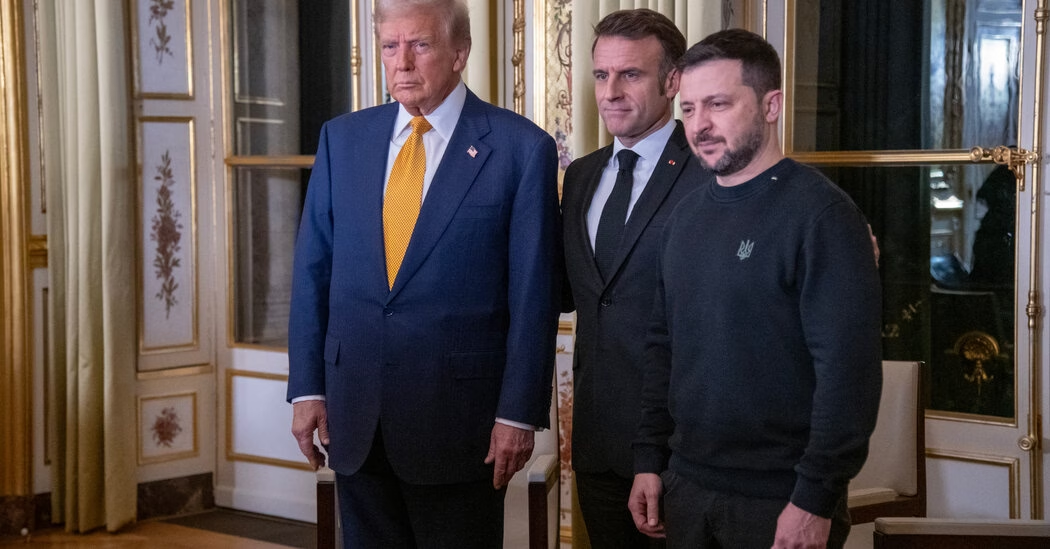When the United States Treasury Secretary, Scott Bessent, made a trip to Kyiv recently, he highly anticipated that President Volodymyr Zelensky would endorse an agreement that would give the United States control over mineral rights. This would have been a significant victory for the Trump administration. However, President Zelensky had his own request: a meeting with President Trump, to finalize a deal that he hoped would ensure continued American support. He expressed, “I hope that in the near future, the document will be ready, and we can sign it during a meeting with Presidents Trump.”
Through leading his country during three years of war, President Zelensky has often played weakened hands smartly. For example, when his capital was attacked early in the war, he emerged from a bunker to record videos calling for national and international resistance to the war, which benefitted him in negotiations that resulted in billions of dollars worth of weapons and ammunition for his army. Still, his methods have not been effective in talks with the Trump administration, and his request for a presidential meeting was rejected. This highlights a dramatic personal style that was helpful in the nation’s struggle but now seems to hinder relations with the Trump administration.
There is considerable debate in Ukraine regarding whether President Zelensky should have responded to President Trump’s insults with retaliation or tried to diplomatically manage the U.S. president’s attacks. Though President Trump’s claim that Ukraine began the war with Russia was incorrect, President Zelensky infuriated him by publicly correcting the record and claiming that the American president was ensnared in a “web of disinformation” perpetuated by the Kremlin. President Zelensky’s response may have been necessary to protect his nation’s interests, but it may also have been a misstep in dealing with an empowered leader who doesn’t tolerate criticism and essentially has the fate of Ukraine in his hands.
Many Ukrainians have praised President Zelensky for standing up to President Trump, despite the personal enmity becoming a barrier. In recent days, President Zelensky stated he would resign as president if it would bring peace to Ukraine, though it’s unclear whether he is serious about that option. European leaders have also advised him to avoid escalation, including during a phone call with Poland’s President Andrzej Duda, who wrote in a post on X afterwards, “I suggested to President Zelensky to remain committed to the course of calm and constructive cooperation with President Donald Trump,” indicating his belief that President Trump truly cares about global stability and peace.
Critics have noted that President Zelensky’s style has caused frustration before. During visits to Western capitals in an effort to secure more aid for Ukraine, he would occasionally lecture leaders to the point of frustration. The U.K. defense secretary Ben Wallace once responded that “like it or not, people want to see a bit of gratitude.” Additionally, the Ukrainian president has frustrated military leaders from the US by ignoring their recommendations regarding battlefield strategy. This situation has now become a more significant problem, with the future of American military aid and support in peace talks at stake.
Over the past two weeks, President Zelensky has chosen not to sign the minerals deal, insisting that Ukraine will not accept any negotiation outcome from President Trump’s negotiations if Ukraine is not included. Despite supporting this diplomatic strategy, some in Ukraine acknowledge that President Zelensky’s showmanship is an issue.
Recently, at multiple public appearances, including security conferences and news conferences, he reiterated his refusal to abide by President Trump’s negotiations if they exclude Ukraine. This constant public emphasis on Ukrainian involvement has frustrated President Trump, who stated on Fox News Radio that “He’s been in meetings for three years, and nothing got done.” Despite the challenge, American leaders often use threats and strongarm tactics to advance their agendas, and President Trump may ultimately be fine with President Zelensky’s involvement in the process.
On Sunday, rather than softening his stance as advised by some European leaders, President Zelensky doubled down on his earlier comment that President Trump is surrounded by Russian “disinformation” about the war. He pointed to instances where President Trump exaggerated the amount of aid that Washington has provided to Ukraine. Additionally, President Zelensky challenged President Trump’s claim that the Ukrainian leader only has a 4% approval rating.
This isn’t the first time Ukraine has clashed with President Trump. During his first term, Ukraine proposed deals to purchase coal and locomotives from Pennsylvania, which won him a public-relations coup in terms of job creation in a crucial electoral swing state. Ukrainian authorities also secretly closed an investigation into under-the-table payments in Ukraine to Paul Manafort, who was then chairman of President Trump’s 2016 campaign. This led to Ukraine obtaining permission to buy Javelin anti-tank missiles, which marked the first instance of lethal military aid granted to the country.
Many in Ukraine today argue in favor of a voice in talks shaping their future, and they view President Zelensky’s demand as a popular stance within the country. There is little enthusiasm for trading the army’s accomplishments in fighting Russia after three years of war—without involvement from Kyiv.
Source: https://www.nytimes.com/2025/02/24/world/europe/ukraine-zelensky-trump.html




